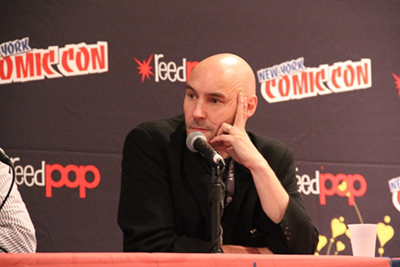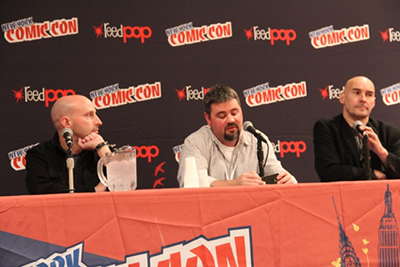It’s not often you get to sit down in a room with three of the biggest names in the comic book industry and hear them talk about how to write. At New York Comic Con earlier this month, a giant room full of aspiring writers and fans crowded together to get advice and tips from three industry giants whose writing has inspired and intrigued for years: Grant Morrison (All-Star Superman, The Invisibles, Batman, New X-Men), Jonathan Hickman (Fantastic Four, Manhattan Project), and Brian K. Vaughan (Y: The Last Man, Ex Machina, Runaways, Saga). Throughout the hour, they dished on the creative process, their inspiration, and answered questions from the audience.
What set this panel apart from any other author’s lecture was the focus on writing for graphic novels and comics as an industry and the unique challenges that a comic writer might face. As the moderator began, he advised the audience to “start taking notes.” He wasn’t wrong. What followed was a very candid one hour back and forth about the unique challenges of comic writing from three of the industry’s masters.
The writers began the talk by focusing on the different ways they all “broke into” the comic book business. Brian K. Vaughan explained how he was picked up by a Marvel talent-share workshop at New York University way back in the day, while Jonathan Hickman didn’t write a script until he was already working in the industry. He credits a reverse engineering process for his writing style, as he read comics that he enjoyed and then used them as a starting point to figure out how he’d write in the future. Grant Morrison also pointed to his double-duty as an artist as well as a writer as part of his process, as his process was informed by his ability to visually lay out his work as well as write the scripts.
The way in which the question shifted from the actual act of “being discovered” to how their process worked highlighted an important theme of the lecture: you break in by doing good work and putting it out in the world. All three writers seemed intent on pointing out that the way to get into the business has less to do with some magical trick that gets you discovered than working hard and sharpening your craft.
“The more you do, the better you get,” said Morrison. “The only problem I find with it is sometimes you do a lot of comic books and it’s hard to switch to something else because you get stuck in the mode of a comic book. The same when you’re working on screenplays… you get stuck in a mode. So most of us up here do a bunch of different things because it keeps your hand in… different types of writing. It’s good to learn to write plays, it’s good to learn to write songs, to write movies and comic books, because each one is a slightly different discipline, and it sharpens up your tools.”
This intimate tie between the art and the writing of the comic was a key component of the discussion about how to produce good work in comics or graphic novels. “A comic script is basically a love letter from you to your artist,” said Vaughan, “so every script I write for each book is different… Don’t get sort of set on one style, speak to your artist.” They all cited working with their artist as a fundamental part of the collaborative process. Vaughan pointed out that he never sends back a piece of art if he can help it, as it’s taken the artist such a long period of time and they’ve invested so much energy into it. “The artists get away with a lot,” joked Morrison. “Yeah, maybe we shouldn’t tell them that,” replied Vaughan.
The second factor that set this talk apart was the candor of the writers on the board. When asked about organization and the dreaded writer’s outline, Brian K. Vaughan joked, “I’ve learned that the writer is kind of like the pilot of an airplane: you never want your pilot to sound like he’s nervous, or like he’s making it up as he goes along. So I either have it all plotted out exactly, or I lie and say I have it plotted out exactly.” He then added, “But I always have it plotted out exactly.” By contrast, Jonathan Hickman said that his Manhattan Project was the first time he didn’t plot everything out in advance. Hickman pointed to deadlines these days as more of his driving force behind organization and good writing.
They were equally as candid when talking about the editing process and the feedback they’ve gotten on their work, especially the consumer response. “I’m trying to find a delicate way to say ‘no, I don’t care,’” said Vaughan, pointing out that he’s more interested in his artist’s input than editors when creating a book. Jonathan Hickman’s response was more direct and garnered a lot of laughs and nods in the audience when he added, “No one hates me like me.” That self criticism seems to be at the heart of sharpening those tools that Morrison mentioned. Brian K. Vaughan went on to quote Neil Gaiman as saying, “Try to get published as soon as you can because nothing will make you get better, faster than knowing that complete strangers are reading your terrible writing.”
The writers also got into technical issues, like length of the scripts and how much content to put on one comic page. Hickman stated that he won’t create more than one typed page of writing per comic script page. “You should be able to describe [a panel] in, not a single sentence, but two or three.” He described his formula for page creation as five panels, no more than twelve word balloons. “It’s how a comic page feels to me now,” he indicated, being sure to point out that this formula is a guideline and not a hard and fast rule. However, they all seemed to point to a delicate balance in comic construction between the artwork and the amount of dialogue, pointing to a tendency in comics to overdo the “talking head” convention. “A comic page with too many word balloons looks like it’s choking to death,” Morrison warned.

And what about that magic question: how do you create such memorable characters? Morrison’s answer was more traditional. “You hear the voices in your head,” Morrison said. “With me, the characters usually spring fully-formed. I know what their favorite music is, what they like to eat, what movies they like.” That kind of clarity was the subject of much envy on the panel. “That makes me want to kill myself,” joked Vaughan. “Some writers have that… while I sit in a quiet dark room, saying ‘Where are you? Talk to me!’”
The different responses to a “simple” question about characterization pointed to the heart of what was wonderful about the Writer’s Room discussion. Each writer pointed to their evolution and creation process as diverse, unique, and developed through good habits and hard work, a lesson they imparted on all those listening. The key to the entire discussion seemed to just be: learn from what you’ve seen, go out and write, and keep to your vision. And in the end, be ready to move on to the next project. Said Hickman, “There’s that old cliché that art is never finished, only abandoned. That’s the nice thing about comics. It forces you to abandon it long before maybe you’re ready to let it go.”
That spirit of fearlessness and focus on growth was an invaluable lesson, passed along to a whole crop of aspiring writers for the future. Much thanks to these three amazing writers for their time and wisdom at NYCC this year.
Shoshana Kessock is a comics fan, photographer, game developer, LARPer and all around geek girl. She’s the creator of Phoenix Outlaw Productions and ReImaginedReality.com.










